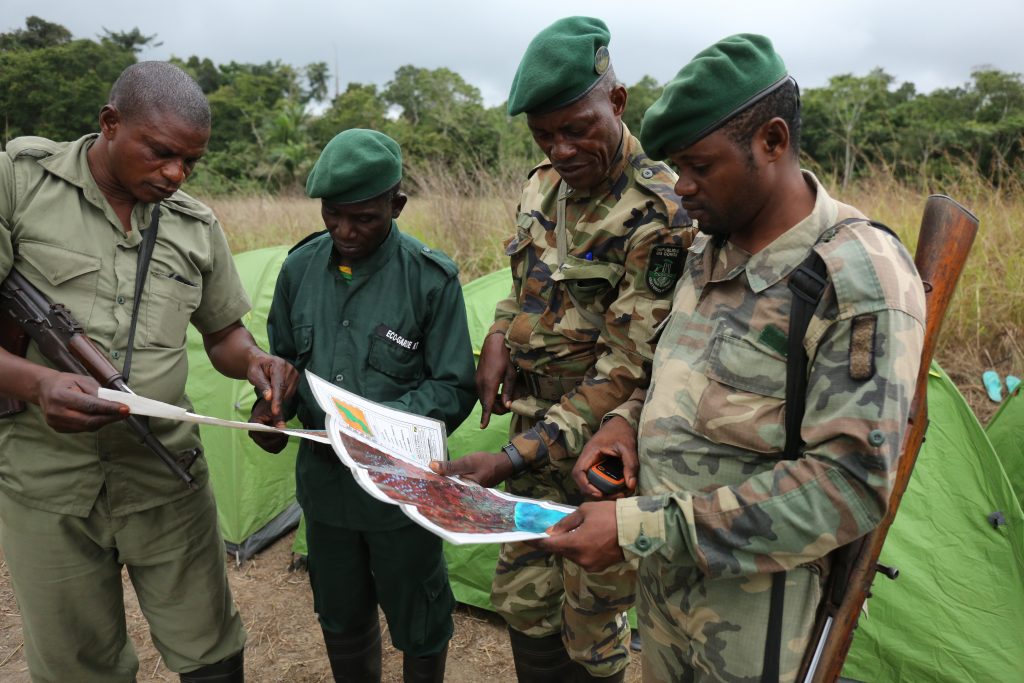“It is the missing piece of the puzzle in conservation, protecting endangered species and nature itself. We must all come together to ensure we protect the rangers themselves on the front line.”
–Dr. Jane Goodall
Every day, park rangers risk their lives to protect wildlife and wild places from poaching and other threats. Sadly, it’s estimated that over 1,000 park rangers have been killed in the line of duty over the past 10 years. A large percentage of these are due to commercial poachers and armed militia groups. Park rangers are generally under-equipped, underpaid, and often under-appreciated. We think they are heroes.
Becoming a park ranger is no easy feat, Their tasks are multifaceted and include a HUGE range of not only dangers and hazards, but they quite literally put their life on the line every day to ensure the safety of some of our most treasured wildlife. Rangers are real life super heroes, and their work is only possible thanks to generous donors like you.
Earth Warriors
Getting there is not a job for the faint hearted. Many of the Jane Goodall Institute Rangers are the ‘boots on the ground’ in Africa’s protected areas. Including Tchimpounga.
These rangers are in charge of undertaking rigorous patrols of law enforcement and wildlife monitoring, community engagement and conservation management activities. It takes a unique type of individual to perform tasks expected of a park ranger in what are often extreme conditions. Due to the physical nature of the job, a high level of fitness and of course strength is required.
Our friends and partners at the Thin Green Line Foundation know firsthand just how gruelling this onboarding can be. Sean Wilmore, President of the International Ranger Federation, Founder of The Thin Green Line Foundation and our Park Ranger program, has worked closely and tirelessly in a joint effort with the Jane Goodall Institute rangers to oversee and ensure a longstanding protection program is in place for chimpanzees across Tchimpounga.
“Rangers are the missing link in conservation. ” –Dr. Jane Goodall
Some of the below may be confronting for some readers. Reader discretion is advised due to some difficult subject matters.

Tragically 75 per cent of rangers have been killed since 2016 as a direct result of poaching and wildlife trafficking, many murdered by the poachers that they were attempting to stop.
The Jane Goodall Institute has a long history with rangers and relies on these strong allies to keep our conservation initiatives functioning and progressing. In our many protected areas of research and conservation throughout Africa, we depend on rangers for many things, including:
• Resource protection/management
• Public safety
• Patrolling grounds
• Enforcing regulations
• Conducting investigations
• Performing search and rescues
• Assistance in medical emergencies
• And arguably most imperatively: Preventing wildlife poaching
The front line of fighting extinction
In the Congo Basin poachers kill thousands of chimps as a part of the illegal bushmeat trade, allowing only the smallest to live to be sold off as pets. The animal lives saved is an enormous figure directly thanks to the work of rangers preventing these poachers from succeeding. Without these protectors, endangered species like chimpanzees may be gone from this world forever.

You may have heard of the term ‘wildlife trafficking,’ in the context of graphic imagery of elephants being brutally murdered for their tusks, or piles and piles of the fins of sharks drying on the concrete.
Public demand for wildlife and wildlife products has resulted in a boom of illegal trade, that is quickly pushing endangered species toward extinction. Working on the ground to prevent this tremendous loss of life is a fight against extreme danger and cruelty. It is because of the heroism of park rangers, that so many have been saved.
Everyday Jane Goodall Institute rangers risk their safety to protect chimps and their habitats at the 50,000 hectare Tchimpounga Nature Reserve. Without their bravery and self-sacrifice, our vision to ensure the long-term survival of chimpanzees would not be achievable.
“We work to equip, train and support rangers fighting on the front line of conservation, predominantly in conflict zones and developing countries,” explains Sean. “We also give direct support to the widows and families left behind.”
From dawn to dusk
A morning routine commences at dawn, yet sleep is not something our rangers often receive. Their routine foot patrols start from one of three permanent bases that are strategically placed to maximise the rangers ability to detect illegal activity.

Even though they always follow the same route, no two days are alike. Sometimes they’ll be removing dozens of snares that have been set to trap animals for bush meat. Other times they’ll come across illegal hunting of logging camps.
Dangers after dark
Night time is the most dangerous for our rangers.
Often these camps are unattended, so the rangers confiscate any remaining weapons or illicit material such as animal remains or charcoal, then dismantle any structures that have been built. The rigorous training our rangers receive means they’re ready and able to respond to potentially life-threatening situations, such as encounters with armed poachers.
The rangers also conduct random patrols from temporary camps to access remote areas, catch people that may have become aware of their usual routes, or respond to reports of illegal activity from the community. While stationed at these camps, which can be set up for weeks at a time, the rangers live in small tents.
Although this is tough, the rangers know their work is crucial to the protection of the reserve, so they persevere.

Team work
The permanent bases are placed to allow the rangers to carry out vehicle checks in high-traffic areas too. Here they work with the Republic of Congo’s first canine wildlife detection unit to inspect all vehicles entering and exiting the reserve.
This team of five highly-trained dogs help the rangers detect weapons, ammunition, animal remains, and timber that people attempt to smuggle out. They’ve been so successful at managing illegal activities that the Congolese government is working with JGI to expand the program into nearby protected areas like Conkouati Douli National Park.
A fourth permanent base is located along the Kouilou River near Tchimpounga Chimpanzee Rehabilitation Centre (TCRC)’s island sites. Rangers stationed here conduct boat patrols to maintain the safety of the chimps. They make sure villages using the river maintain an appropriate distance from the islands and remove any illegal fishing nets they discover.

In addition to patrols and vehicle checks, each year during the dry season the rangers set up breaks to protect the chimps and sanctuary from uncontrolled fires. Local communities burn fields and Savannah within the reserve to make the foraging of mushrooms and plants easier. Unchecked these fires pose a significant threat to the sanctuary, so the rangers use breaks to minimise their risk.
Eternal gratitude
We thank the unflinching heroism of people in the field making sure that our wild places remain wild, and safe. We would especially like to thank our Eco-Guards ever present at our Chimp Rehabilitation centre at Tchimpounga.
The dedication of our rangers means the chimps within the Tchimpounga Nature Reserve are far less vulnerable to the threats of poaching, habitat loss, and disease. Because of the generosity of supporters like you, they’re able to carry out this crucial, courageous work.
GIVE TODAY: BECOME A CHIMP GUARDIAN










